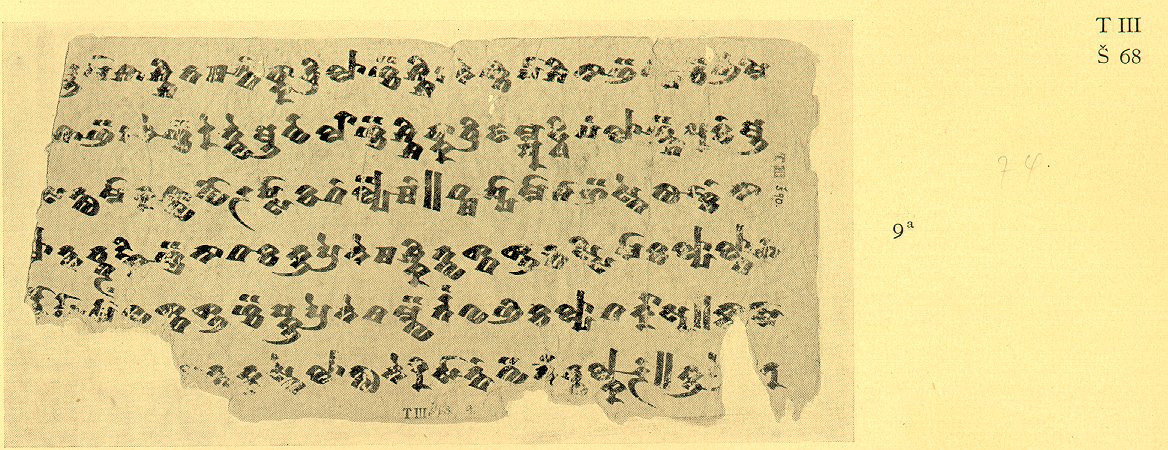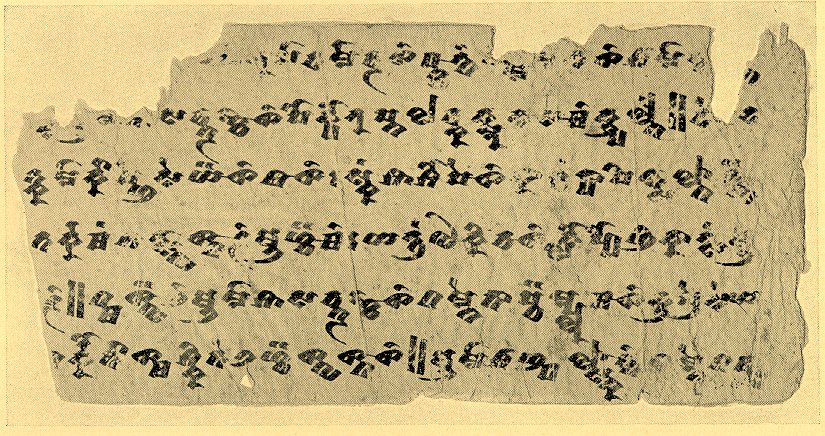A 74
| Known as: | A 74; THT 707 |
|---|---|
| Cite this page as: | Gerd Carling. "A 74". In A Comprehensive Edition of Tocharian Manuscripts (CEToM). Created and maintained by Melanie Malzahn, Martin Braun, Hannes A. Fellner, and Bernhard Koller. https://cetom.univie.ac.at/?m-a74 (accessed 01 Jul. 2025). |
Edition | |
| Editor: | Gerd Carling |
Provenience | |
| Main find spot: | Shorchuk |
| Specific find spot: | Stadthöhle |
| Expedition code: | T III Š 68.09 |
| Collection: | Berlin Turfan Collection |
Language and Script | |
| Language: | TA |
| Script: | late |
Text contents | |
| Title of the work: | Mūghapakkha-Jātaka |
| Passage: | f |
| Text genre: | Literary |
| Text subgenre: | Jātaka/Avadāna |
| Verse/Prose: | prose; verse |
| Meter: | 5555 (1x), 444343 (1x), 55 (1x), 4443 (1x) |
Object | |
| Manuscript: | A 55-88 |
| Preceding fragment: | A 84 |
| Following fragment: | A 81 |
| Material: | ink on paper |
| Form: | Poṭhī |
| Number of lines: | 6 |
Images
Images from titus.fkidg1.uni-frankfurt.de by courtesy of the Thesaurus Indogermanischer Text- und Sprachmaterialien (TITUS).
Transliteration
(continues from A 84)
| a1 | /// ā mā śā śśi ta ma¯ ¯nt ckā cri lā ñcä śśi : n[e] ñci pā śi nā¯ ¯ñä ypi¯ ¯cä ñe mi |
|---|---|
| a2 | /// śā¯ ¯ñä : ne¯ ¯ñcä re twe ā rwa rlā ñcä śśi ckā cri ja mbu dvi paṃ lā¯ ¯ñśä pu¯ ¯k ā |
| a3 | /// sa ttu mā ka śwā wo ra ṣsā ka¯ ¯t lyä¯ ¯m || tma ṣṣā mā śā¯ ¯ñä sne tu¯ ¯ṅk nā |
| a4 | /// lā nta ctra ṅki¯ ¯ñcä nā ta¯ ¯k ku pre ne ma śki twa s̝ta s̝la nta ssi mā ka lpā ltā¯ ¯s̝ |
| a5 | /// r[k]o r[py]ā māṃ wa s̝ta s̝la ñcä ṣku pre ne sa mwä rtaṃ wa ñi ka lpā ta rkā su || knā nmā |
| a6 | /// [nt]· ku sne lā ntu ne ri sā¯ ¯nt wä rta cka lka¯ ¯r || ku pre – nu |
| b1 | /// [pe] nu pā ca rmā cra¯ ¯s̝ pka¯ ¯nt ·m· m· na¯ ¯s̝ śā mā [nt]· ·t· |
| b2 | /// ·m· [ā] [mā] [śā] sa ctra ṅka¯ ¯s̝ ṣo kyo nu ṣna la cka kmu na sa¯ ¯m kuya lte || de [va] da |
| b3 | /// tka mā rkā pñe se yä¯ ¯s̝ na¯ ¯s̝ : sukaṃ śā śo ṣe¯ ¯s̝ kā rka ryā ṣi wsā ltā [t]wä |
| b4 | /// ta rka maṃ na tswā s̝ta¯ ¯r ā ñcä¯ ¯m : ya ntraṃ o ki ca¯ ¯s̝ klo pyo ñi kā tsaṃ ā |
| b5 | /// ¯r || tma s̝wä¯ ¯l ā mā śā sa ctra ṅka¯ ¯s̝ ta mne tā ṣcä mplu ma¯ ¯s̝ ku pre ne ya |
| b6 | /// ta rko rtā s̝ma śki te la ñcä s̝wa s̝ta¯ ¯s̝ || ā mā śā ñpa lskā¯ ¯nt ta mne sa m[ma] |
(continues on A 81)
Transcription
(continues from A 84)
| a1 | /// āmāśāśśi tamänt ckācri lāñcäśśi : neñci pāśināñ ypic ñemi |
|---|---|
| a2 | /// śāñ : neñc retwe ārwar lāñcäśśi ckācri jambudvipaṃ lāñś puk ā |
| a3 | /// sattu mā kaś wāworäṣ sākät lyäm ॥ tmäṣṣ āmāśāñ sne tuṅk nā |
| a4 | /// lāntac träṅkiñc nātäk kupre ne mäśkit waṣtäṣ läntässi mā kälpāl tāṣ |
| a5 | /// rkor pyāmā-ṃ waṣtäṣ läñcäṣ kupre ne säm wärtaṃ wañi kälpātär kāsu ॥ knānmā |
| a6 | /// nt· kus ne lāntune risānt wärtac kalkar ॥ kupre – nu |
| b1 | /// penu pācar mācräṣ pkänt ·m·m· naṣ śāmān t· ·t· |
| b2 | n1 /// ·m· āmāśāsac träṅkäṣ ṣokyo nu ṣnalac kakmu nasam kuyalte ॥ devada¬ |
| b3 | (ttenaṃ)n1 |
| 1a | 12σ /// (wä)tkamār ; kāpñe seyäṣ näṣ : |
|---|---|
| 1b | sukaṃ śāśo ṣeṣ ; kārkäryāṣi ; wsāl tātwä b4 11σ |
| 1c | 2σ /// tarkam-äṃ ; nätswāṣtär āñcäm : |
| 1d | yantraṃ oki ; caṣ klopyo ñi ; kātsaṃ ā b5 4σ |
| * | /// r ॥ tmäṣ wäl āmāśāsac träṅkäṣ tämne tāṣ cämplumäṣ kupre ne ya¬ |
|---|---|
| b6 | (s) /// tärkor tāṣ mäśkite läñcäṣ waṣtäṣ ॥ āmāśāñ pälskānt tämne säm mä |
(continues on A 81)
Translation
(continues from A 84)
| a1 | ... to the ministers daughters were born, [and] to the kings. |
|---|---|
| a1+ | Certainly vessels full of pearls... |
| a2 | ... ministers. The daughters of the kings are ready for a union, |
| a2+ | all other kings in Jambudvīpa |
| a3 | ... The Bodhisattva sat silent, without paying attention. |
| a3+ | Thereupon the ministers, [with regard to] the one being loveless, say ... to the king: |
| a5 | Oh lord, if the prince should not succeed in leaving the house ... give him [your] permission! He shall leave the house. If he obtains pleasure in the forest, [then it is] good. |
| a5+ | Judicious ones... |
| a6 | ... who gave up kingship [and] went to the forest. |
| a6+ | But if... |
| b1+ | ... Also (for) the living there is (nothing) ... but father [and] mother. |
| b2 | ... (Thereupon the king) says (heatedly) to the ministers: I have truly come to be deeply worried (?), because: |
| b2+ | || In the D.-(-tune: ||) |
| b3 | ( ... if) I separate from [my] dear son. |
| b3+ | He was living in happiness, wrapped in a beggar’s garment |
| b4 | ... (If) I do (not) give him permission, he will starve himself. |
| b4+ | As if [caught] in a pair of tongs [I am] because of this suffering, (depressed in the heart) [and] in the belly. (1. ... Give him permission!). |
| b5 | Thereupon the king speaks to the ministers: |
| b5+ | So it shall be, [oh] skilful ones, if you... |
| b6 | ... permission the prince shall have. May he leave the house. The ministers thought: in that way the prince |
(continues on A 81)
Other
| a5 | If he obtains pleasure in the forest, it [is] good. (Peyrot 2013b: 645) |
|---|---|
| a5 | ... gib ihm die Erlaubnis! Er soll aus dem Hause gehen. Wenn er am Wald Gefallen findet, [dann ist es] gut. (Schmidt 1974: 196) |
| a6 | ... welche die Königswürde aufgaben [und] zum Walde gingen. (Schmidt 1974: 417) |
| b3 | ... (wenn) ich mich von [meinem] lieben Sohn trenne. (Schmidt 1974: 278) |
| b4 | If I do not let him go, he will starve himself out. (Peyrot 2013b: 637) |
| b4 | [Wenn] ich ihm (nicht) die Erlaubnis gebe, wird er von selbst verhungern [wtl. das Selbst verhungern lassen]. (Schmidt 1974: 314) |
| b5 | So it will be. (cf 23) (Peyrot 2013b: 624) |
| b6 | … the prince will have permission: he may leave the house. (cf 23) (Peyrot 2013b: 219) |
Commentary
Remarks
| Transcription and translation are based on Carling et al. 2009. | |
| Transcription and references have been transferred from the "Text and Reference Database of the Tocharian A Language" (Gerd Carling Lund University) (funded by the Bank of Sweden Tercentenary Foundation and SCAS). | |
| This text immediately continues from A 84 and continues on A 81. |
Philological commentary
| The translation is largely based on Sieg 1952: 22-23, and Carling et al. 2009. | |
| n1 | This tune has 20/22/10/15 syllables, rhythm 5/5/5/5 + 8/7/7 + 5/5 + 8/7. |
References
Online access
Edition
Sieg and Siegling 1921: 43-44; Sieg and Siegling 1921 p. 43, p. 44
Translations
Carling 2000: a2 (121), a6 (115), b2 (240), b4 (214); Knoll 1996: a5 (30), b1 (28); Kölver 1965: a2 (116), a4 (139), a6 (80), b2 (82), b3 (111, 144); Peyrot 2013b: a4 a5 (266, 275), a5 (645), b4 (637), b5 (624), b6 (219); Schmidt 1974: a5 (196), a6 (417), b3 (278), b4 (314); Sieg 1952: a1 a2 a3 a4 a5 a6 b1 b2 b3 b4 b5 b6 (22-23); Thomas 1952: a4 (42); Thomas 1954: a4 (716); Thomas 1957: a6 (229), b2 (246), b3 (302); Thomas 1983: a3 (20), a5 (40), a6 (40)
Bibliography
Carling, Gerd. 2000. Die Funktion der lokalen Kasus im Tocharischen. Berlin/New York: de Gruyter.
Carling, Gerd, Georges-Jean Pinault, and Werner Winter. 2009. A dictionary and thesaurus of Tocharian A. Volume 1: Letters a-j. Wiesbaden: Harrassowitz.
“The International Dunhuang Project: The Silk Road Online.” n.d. http://idp.bl.uk.
Knoll, Gabriele. 1996. “Die Verwendungsweisen der Adjektive im Tocharischen.” PhD, Universität Frankfurt am Main.
Kölver, Bernhard. 1965. “Der Gebrauch der sekundären Kasus im Tocharischen.” PhD, Universität Frankfurt am Main.
Peyrot, Michaël. 2013b. The Tocharian subjunctive. A study in syntax and verbal stem formation. Vol. 8. Brill’s Studies in Indo-European Languages & Linguistics. Leiden/Boston: Brill.
Schmidt, Klaus T. 1974. “Die Gebrauchsweisen des Mediums im Tocharischen.” PhD, Universität Göttingen.
Sieg, Emil. 1952. Übersetzungen aus dem Tocharischen II, aus dem Nachlass hg. v. Werner Thomas. Abhandl. d. Deutschen Akad. d. Wissenschaften zu Berlin, Kl. f. Sprachen, Literatur und Kunst 1. Berlin: Akademie-Verlag.
Sieg, Emil, and Wilhelm Siegling. 1921. Tocharische Sprachreste, I. Band. Die Texte. A. Transcription. Berlin/Leipzig: de Gruyter.
Sieg, Emil, and Wilhelm Siegling. 1921. Tocharische Sprachreste, I. Band. Die Texte. A. Transcription. Personal annotated copy of Wilhelm Siegling. Scanned by Douglas Q. Adams with the technical assistance of Michael Tarabulski and Kevin Dobbins. Berlin/Leipzig: de Gruyter.
Thomas, Werner. 1952. Die tocharischen Verbaladjektive auf -l. Deutsche Akad. der Wissenschaften zu Berlin, Institut für Orientforschung 9. Berlin: Akademie-Verlag.
Thomas, Werner. 1954. “Die Infinitive im Tocharischen.” In Asiatica. Festschrift Friedrich Weller. Zum 65. Geburtstag, gewidmet von seinen Freunden, Kollegen und Schülern, edited by Johannes Schubert and Ulrich Schneider, 701–64. Leipzig: Harrassowitz.
Thomas, Werner. 1957. Der Gebrauch der Vergangenheitstempora im Tocharischen. Wiesbaden: Harrassowitz.
Thomas, Werner. 1983. Der tocharische Obliquus im Sinne eines Akkusativs der Richtung. Abhandlungen d. Geistes- und Sozialwissenschaftlichen Klasse 6. Mainz: Verlag d. Akad. d. Wissenschaften und d. Literatur.
Gippert, Jost, Katharina Kupfer, Christiane Schaefer, and Tatsushi Tamai. n.d. “Thesaurus Indogermanischer Text- und Sprachmaterialien (TITUS): Tocharian Manuscripts from the Berlin Turfan Collection.” http://titus.fkidg1.uni-frankfurt.de/texte/tocharic/thtframe.htm.




